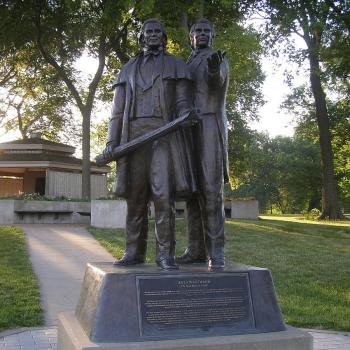Most important, I was taught that faith and belief are verbs, not nouns; we don't believe and sit down, content that we are saved. As Rowan Williams, the archbishop of Canterbury, puts it, once we take an initial step of trust, "the actual teaching, the doctrine, flows out of that."[ii] We don't have to know everything from the start; much will be revealed on the journey. William Sloane Coffin put it this way: "I love the recklessness of faith. First you leap, and then you grow wings."[iii]
We begin to believe and go right on believing, even though sometimes, given the state of things, it requires real effort.
But if we don't assent to a simple salvation equation, what do we believe?
What makes us Christian if it isn't a declaration of faith?
My rector (the priest in charge) when I walked in the back door of St. James Episcopal in Austin was Greg Rickel, the Episcopal bishop from western Washington we met in the introduction (chap. 1). During my confirmation class, he taught us the basics of our faith; I discovered that there were plenty of things I'd been taught while growing up that didn't seem to matter anymore—and some things I had never been taught that mattered a great deal.
Brian McLaren has written that one of the things that turns away those seeking Jesus is that too often they are asked by the churches or denominations they enter to "swallow a lot of additional stuff"; these are things that are not essential items of faith, perhaps, but they have become so important in those traditions that they can't be separated from true orthodoxy. In Pentecostal churches, say, it might be the importance of speaking in tongues; in Baptist congregations, it might be the condemnation of dancing or alcohol; in Roman Catholic circles, it might be veneration of the saints. These are things that these Christians believe define Christianity, even if they're not necessarily accepted by other followers of Jesus as important.[iv]
How do we sort these out?
What do we believe, and how?
For many people, these questions can be answered satisfactorily by the historic creeds of the church: the Nicene Creed, the Apostles' Creed, the Athanasian Creed. For many centuries these creeds have been a gathering place for Christians from various traditions and beliefs, and they remain meaningful today. Some years ago when Chris Seay and I began working on a new Bible translation for emerging Christianity, The Voice, we rounded up writers and scholars from all over the contemporary Christian landscape. There were people from the emerging Christian tradition like Chris and Brian McLaren; there were members of mainline Protestant churches like Lauren Winner and Phyllis Tickle and me; there were evangelical Christians; there were Roman Catholics. There were liberals, moderates, and conservatives.
And all of us were involved in putting together this enormous, costly, and quite controversial project for Thomas Nelson, the world's largest religious publisher. It's better known as the publishing home of such folks as Billy Graham and Christian inspirational writer Max Lucado than as the home of cutting-edge Christianity.
I'd have to speculate that there was some nervousness at Thomas Nelson around gathering all these different birds inside one cage, and I'm sure they expected (and got) some attacks on the project because of that. To defuse charges of heresy or unorthodoxy, the publishers asked Chris and me if there was any way we could come to some basic agreements on what we, as a group, believed. I know from experience, often through interactions with people I love, that many people who call themselves Christian nonetheless seem to hold some particular beliefs that are diametrically opposed to mine.
At the Voice project, none of us wanted to sign some narrow statement of belief (unless, of course, it was our own narrow beliefs), but it didn't take us long to realize that we did have something we could all affirm: The Nicene Creed, something that has been repeated by Christians since the early days of the church.
The creeds are actually the formational documents of Christianity. We call them creeds because they come from the Latin word credo, which means "I believe" or "I give my heart to." When we say the creeds, as many Christians do in worship and in prayer, we are declaring that these are the beliefs of our hearts, that these are the beliefs that define who we are, the stories by which we understand our own stories.
The two best-known creeds, the Nicene Creed and the Apostles' Creed, go back to the very first centuries of the Christian Church, and they embody a set of beliefs that, challenging as they might be, have satisfied Christians for over fifteen hundred years. They also, as you have heard, represent a set of unifying beliefs around which Christians from different traditions can still gather, which is what they were intended to do; when the Roman emperor Constantine convened the Council of Nicaea in AD 325, the gathered Catholic bishops put together a set of beliefs that the majority of them could assent to; a later version, the one we say now, emerged from a similar council of bishops.





